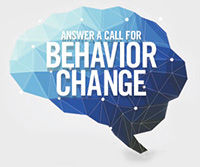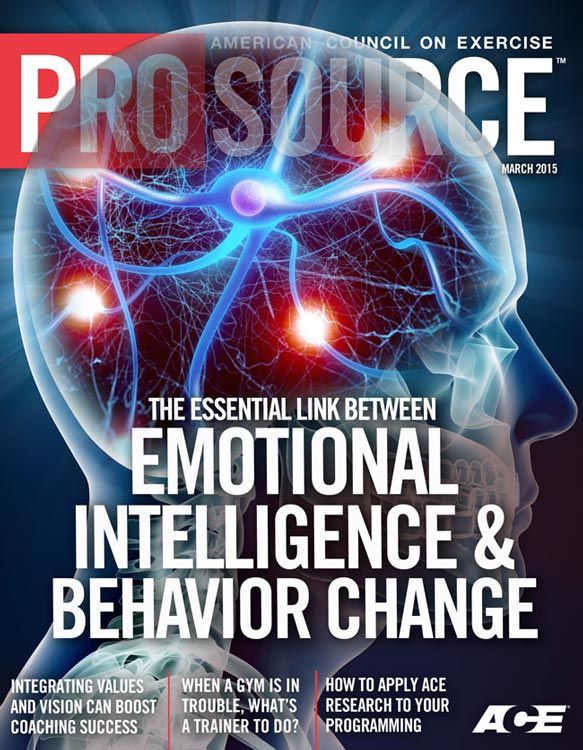
Dr. Robert Biswas-Diener is a recognized authority on the application of positive psychology to the coaching endeavor. He recently spoke with ACE about coaching behavior change. Here are excerpts from that enlightening conversation in which he discusses positive psychology.
In many ways, positive psychology, which is a modern movement and only about 15 years old, is a return to the roots of psychology. If you backtracked and rewound to 100 years ago, psychologists at that time were using science, but they were also in many ways more similar to philosophers. They were interested in things like virtue and ethics, making good decisions, cooperation and so forth.

Develop Skills to Drive Change as an ACE Behavior Change Specialist
No matter how you work with clients and patients, effective coaching can further heighten the impact of your program. As an ACE Behavior Change Specialist, you’ll learn to develop the practical, hands-on skills you need to lead people to long-term, healthy change in one-on-one, group and virtual settings. And you’ll learn from the best. Our interactive learning experience features science-based, time-tested expertise from pioneers in psychology, emotional intelligence, motivational interviewing and coaching.
Take Your Expertise Further.
Learn more at acefitness.org
It was just in the aftermath of World War II that we turned our collective professional attention toward the pressing ills associated with soldiers returning from the front. What was called shell-shock at the time, we would now call post-traumatic stress disorder, schizophrenia, depression and anxiety.
I think it's important that psychology focused on mental illness and problems because they are pressing social ills. I think it's right that we study them and find effective treatments for them. We lost our way in that we focused too much on them to the exclusion of thinking about very worthwhile endeavors like happiness and hope.
It was only in about the last 15 years, spearheaded principally by Martin Seligman at the University of Pennsylvania, that psychologists sort of banded together and said, “Well, what about this other neglected half of positive psychology? Couldn’t we put some research money and attention and some intervention attention toward helping people live better, more fulfilling lives, not just overcome any mental illness or stress?”
Positive psychology is a worthwhile endeavor. That is, I don’t think collectively we are wasting our time by trying to measure or examine or understand happiness. Believe me, I’ve had a lot of pushback over the years against this. People have said things like 'it’s hogwash—you can never measure happiness.' I don’t know why they think we can measure things like depression and intelligence, but not happiness.
Healthy Body, Healthy Mind
When you’re coaching clients, obviously you want them to achieve their physical- and health-related goals, but you’re also working through the medium of the mind. People’s perceptions, attitudes and expectations about a success or failure, what that means to them, the risks they’re willing to take, whether or not they're self-disciplined—these are all fundamentally psychological processes.
Often, when people want to lose weight, for example, you can see that their focus is very, very narrow. They’re looking at a single metric for health—weight in this case—and they might feel discouraged. You want people to feel meaning in life, living in accordance with their own values and feeling like they have a good legacy or are making a contribution. That is living with a sense of purpose, which is distinct from simply feeling joyful.

If we measure people’s general positive emotion, we find that a strong body of evidence pointing to links between feeling happy and being healthier. One of the reasons you suggested is that there is causally a bump in immune-system functioning. [In one experiment], you place people artificially in a positive mood by having them watch a short video that makes them laugh or, alternatively, put them in a sad mood by watching something sad. Then you have them get on a treadmill or you raise their heart rate or blood pressure. The people who have been induced to be in a happier mood have more rapid cardiovascular recovery than people who were induced to be in a sad mood.
Of course, that’s a very small thing. I’m not trying to make some grand claim that feeling happy and having a smile on your face is going to cure cancer. We do not have strong evidence for something like that. But we do know from even better-controlled studies that if you swab the inside of a person’s nose with different forms of the rhinovirus (the common cold), people who were cheerful at the time that they were infected are significantly less likely to get symptoms of the cold.
Can a Person Be Too Positive?
I actually do think there’s [such a thing as] too much positivity and I have several things to say about it. I compare happiness a little bit to a kitten. Kittens are super cute, they’re awesome, they’re fuzzy, but just because one is awesome and cute doesn’t mean you want 50 of them. There is an upper limit to the amount of cats that pay off for you. Happiness works much the same way. If you just mentally, hypothetically think of a 1 to 10 scale, with 10 being perfect consummate bliss and 1 being deep depression or something, people assume that they're trying to get to this 10.
But really you don’t want to be perfectly blissed out. You want some ability to feel guilty so you can correct your behavior, to feel angry so you can defend yourself, and to feel sad so you can withdraw and take stock of your own resources and life directions. Those negative emotions serve a good purpose for us. I always tell people what you're shooting for is an eight. The research in achievement-oriented domains—like doing well in school, making money, doing well at work—suggests that people who are 8 out of 10 actually outperform the folks who are a 9 or 10 out of 10.
Students who are an 8 out of 10 have higher GPAs. People who are an 8 out of 10 at work make significantly more money than those who are a 9 or a 10. I often ask people to rate their positivity on a scale and they might say something like, “I’m a five or a six.” And I say, “Well, that's great because we’re only trying to get to an 8. I call this bringing the finish line closer to home and it’s wonderful because it’s really empowering. They’d say, “What, I'm only trying to get to an 8 and I'm already to a 6. I only have two to go!” Mentally, they thought they had 4 to go to get to a 10. It’s a kind of tricky but empowering way to boost their motivation.
Are We Predisposed to Be Happy (or Not)?
There is a genetic component. I’m not going to give you a specific number because I think it can be misleading to say, for example, 30, 50 or 70 percent of your happiness is genetic because what are you going to do with that information? But yes, there is a genetic component, just as there is a genetic component to depression. But genes in your environment interact to sort of unlock one another, so your genes are your predisposition to being more cheerful or a little bit more grumpy if you will.
That genetic predisposition interacts with the society you grew up in and what the cultural messages were about happiness. If you grew up in South Korea versus Canada, for example, you’re probably going to feel a different way in terms of learning how to express your emotions. People have some control over their own emotions. We also adapt back to a certain baseline and this is helpful because you want to go along at a baseline and want to experience spikes in happiness when things go well and drops when things go poorly. Emotions are like a radar system that tells you how life is going. That’s sort of one of their main functions.
For example, if your daughter gets married you want to be able to experience a huge spike in happiness, but you don't want that spike to last the rest of your life. You want to be able to adapt back down to that sort of radar station, a kind of mild positivity. If you get in a minor car accident or get pulled over for speeding, you want to feel a little bit badly about it and then be able to adapt back up. That adaptation is what allows us to take risks in life, to move to a new town, to take a new job or get married. We don't want to get stuck feeling that way forever, but we do have some ability to control our thoughts and feelings so that we can help push ourselves up or slightly down even in the moment.
The Power of Flow
Flow is something that we’ve all experienced before. It’s also known as being in the zone. It’s marked by losing track of time, losing a sense of self, and becoming so integrated with the activity in which you’re engaging that there is no distinction between you and the activity. You are just in flow. You look up and five hours have gone past.

This happens to me often. I rock climb with my son and I’m just shocked—we’re so absorbed by the problems and climbing routes we’re working on that we have no sense of time or no sense of even ourselves. You can have this in all sorts of places. You can have it when you go for a run. You can have it when you’re checking e-mail. You can have it in basically all areas of work. But I find that physical pursuits—playing sports, for example—are great flow experiences for many people.
Flow occurs when the situational demands and the challenges of the tasks are a good match for your level of skill. You probably don’t want to play basketball against a professional basketball player—that would be frustrating because the challenge is too great for your skill. You don't want to play against preschoolers either, because you’d be bored because your skill is too great for the challenge. But when the challenge and the skill fit optimally, that’s when you achieve those flow states.
When working with clients, it can be helpful to see where they’re at emotionally. If they’re expressing frustration or boredom or relaxation or apathy, you can sort of reverse engineer that and say, “I see that there’s too much challenge or too little challenge. We can modify our interventions and bring it more in line.” You want to keep challenging them a bit.
Mindfulness
Mindfulness is really hot right now. I don’t mean to suggest it’s faddish—I’m glad that people have started picking up on it. It originally came out of Eastern traditions and has endured for millennia precisely because it’s a powerful mental technique. When I educate my clients about mindfulness, I explain that most of what we do in our heads all day long is private chatter. We spend a long time telling stories in our heads that are related to the truth, but should not be mistaken for the truth.
For example, if I get in a fight with my wife, I might walk off and continue the fight in my head—all the things I could have said and all the reasons why I was right. When I come in and see dirty dishes in the sink, for example, I make a judgment about why they are there. I tell a story around who failed to do the dishes and why they failed to do the dishes. It’s all completely in my head. If we could, instead, quiet all that chatter and just start perceiving the world as it actually is—there’s a dirty dish in the sink and I have no idea why it’s there. I don’t need to attach any special significance or meaning to it.
I think when people can get out of their heads, especially the negative chatter they have in their heads, and just experience the world in front of them, they can have quite a powerful turnaround. I also think it’s difficult to do—it’s something that people have to practice doing and catch themselves when they head back up into their brain.





 by
by 





